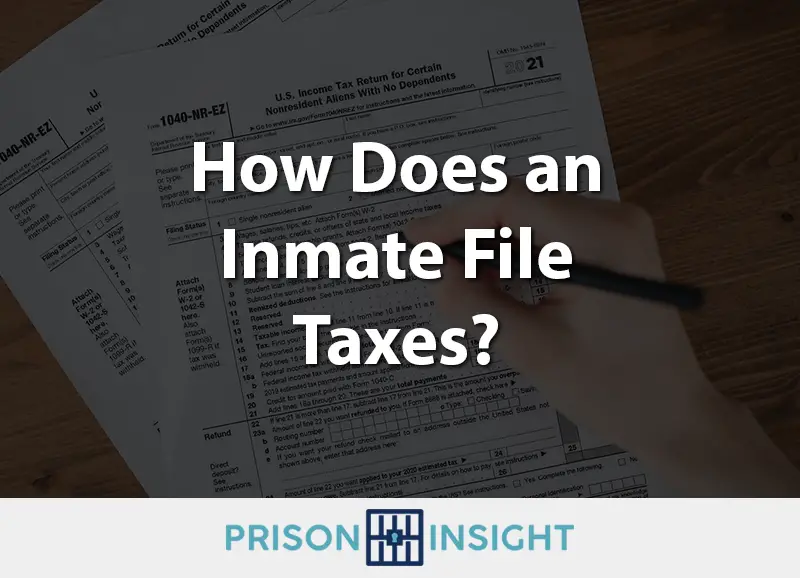It’s tax time once again, and no one is exempt–not even prison inmates. With the United States having the highest incarceration rate in the world, nearly one percent of residents age 18 or older are currently behind bars.
According to the Prison Policy Initiative, that adds up to approximately 2.3 million people confined to prisons and jails. Many of those inmates are required to file a tax return.
Inmates who earn income from work on campus–as well as those who are employed via work release–may have to file a return if their earnings meet the requirements. There are also inmates who held a paying job before their incarceration, and those with spouses who have a reportable income and require a joint filing.
Filing a tax return is difficult enough in the free world, but what about those who are behind bars? How does an inmate file taxes?
In this blog post, I will cover the following topics:
- Tax filing requirements
- Most prisons supply basic tax forms
- Inmates do not qualify for the Earned Income Tax Credit
- Inmates are exempt from ACA requirements
- There are no deductions for ‘charitable’ contributions to an inmate
- The Recovery Rebate Credit
- Consult a tax professional
Tax filing requirements
The tax filing requirements for prison inmates are the same as the requirements in the free world. However, because many inmates earn just pennies a day, they will not meet the threshold.
Gross income requirements for each filing status are:
- Single filing status:
- $12,550 if under age 65
- $14,250 if age 65 or older
- Married filing jointly:
- $25,100 if both spouses under age 65
- $26,450 if one spouse under age 65 and one age 65 or older
- $27,800 if both spouses age 65 or older
- Married filing separately — $5 for all ages
- Head of household:
- $18,800 if under age 65
- $20,500 if age 65 or older
- Qualifying widow(er) with dependent child:
- $25,100 if under age 65
- $26,450 if age 65 or older
Most prisons supply basic tax forms
If an inmate does not have help from friends or family on the outside during tax season, they will still have access to tax forms. Most prisons supply basic forms for both federal and state. Some prisons also provide access to volunteer tax programs. Since inmates don’t have internet access, filing online isn’t really an option.
If an inmate is filing a joint return, they must sign the forms. This can be a bit of a logistical nightmare, but many facilities will allow you to bring these legal forms to a visit so you can get a signature, or you can work with the inmate’s caseworker.
According to the CPA Journal, “In situations where an inmate is unable to complete the required tax returns online or is unable to provide all of the required information to a tax preparer, the inmate can appoint someone to have power of attorney for tax matters. In this case, the inmate must file IRS Form 2848, which authorizes an individual to represent the inmate before the IRS.”
Inmates do not qualify for the earned income tax credit
If an inmate earns an income while incarcerated, those wages are not considered “earned income” for the Earned Income Tax Credit or Child Tax Credit.
Ineligible income also includes amounts paid for work performed while in a work release program or while living in a halfway house.
Inmates are exempt from ACA requirements
Under the ACA, Americans are required to maintain at least minimum health insurance coverage. However, those who are incarcerated are exempt from this requirement.
There are no deductions for ‘charitable’ contributions to an inmate
If you have a loved one who is incarcerated–and you send them money regularly–this is not considered a charitable donation. This is also true for fundraisers, as well as donations intended to assist a wrongfully convicted inmate to pay for their appeals.
The Recovery Rebate Credit
Inmates who never received their Economic Impact Payments–either the first, second, or third payment–during the pandemic are eligible to claim it as a Recovery Rebate Credit.
Offenders can request a blank Form 1040 from their case manager. Case managers will write on the form the offender’s name and DOC ID before giving it to the offender.
Previously, inmates had to call an 800 number in order to resolve this issue. However, the IRS has now developed a process for state departments of corrections to assist offenders.
Consult a tax professional
The topic of inmates filing taxes is an extremely complex issue. We are not CPAs or attorneys. So, if you have a loved one in prison who needs to file a tax return, we suggest consulting a tax professional.
The rules don’t change for prison inmates during tax time. They have to file just like everyone else if they meet the income requirements. However, the issue is access to tax forms, envelopes, and stamps.
Since inmates can’t file online, they need to have access to the proper forms and tools to file a tax return. Most facilities do have case workers that can assist an inmate with tax prep. But, if an inmate doesn’t have someone in the outside world to help them file, it can be an extremely difficult process.
Have you filed a tax return for someone who is incarcerated? Let us know in the comments below.
Sources: Preparing Tax Returns for Inmates https://www.cpajournal.com/2020/05/22/preparing-tax-returns-for-inmates/#:~:text=Most%20prisons%20supply%20basic%20tax,returns%20on%20the%20IRS%20website.&text=Inmates%20may%20also%20file%20their,although%20fees%20may%20be%20incurred. Filing Taxes When A Loved One is in Prison https://www.hrblock.com/tax-center/filing/personal-tax-planning/filing-taxes-loved-one-prison/ How to file taxes while in prison http://maltajusticeinitiative.org/how-to-file-taxes-while-in-prison/ Filing Taxes if you are Currently Incarcerated or Re-Entering Society https://www.taxoutreach.org/blog/filing-taxes-if-you-are-currently-incarcerated-or-re-entering-society/ Prisoner Re-Entry Program https://www.irs.gov/individuals/prisoner-re-entry-program Recovery Rebate Credit https://doc.mo.gov/programs/family-friends/stimulus-check Mass Incarceration: The Whole Pie https://www.prisonpolicy.org/reports/pie2019.html
